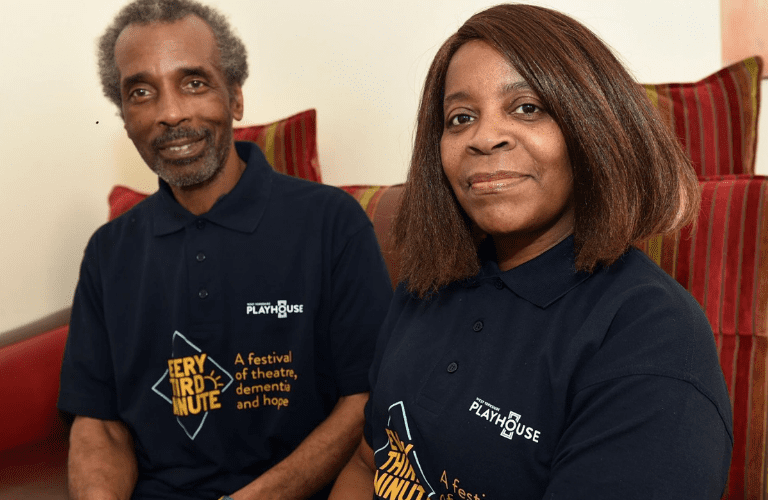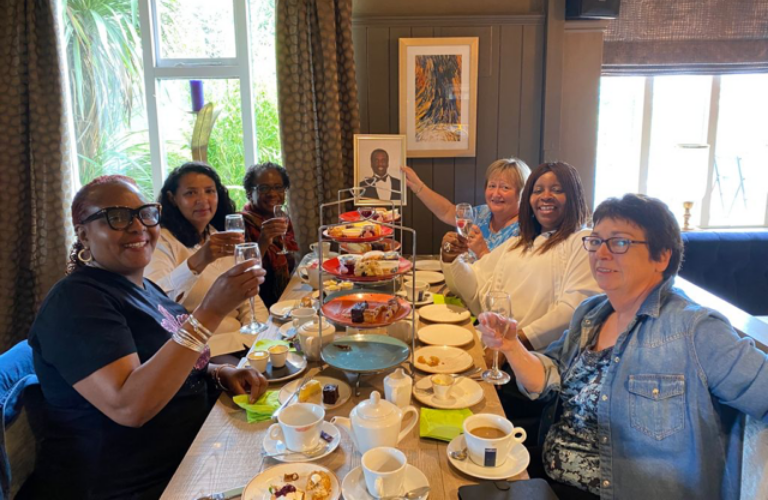Diana and Eugene’s story: "I threw myself into raising awareness of young onset dementia"
Diana shares her experience with her husband, Eugene, who grew up in Saint Kitts, and the cultural barriers they faced when trying to get a diagnosis.

Diana and Eugene
Eugene and I shared a passion for music. He played classical piano and steel drums and I was a singer. Eugene was an incredibly talented musician and music was so important to him. He could transpose any song and put his own twist on it. We first met when Eugene’s steel band were looking for a singer to fill in for a gig. I got the job and ended up staying in the band. We got together and the rest is history! We were married for eighteen years before Eugene passed away aged 68 from dementia in 2020.
Cultural barriers to diagnosis
Eugene was an excellent upholsterer but he knew something wasn’t right when he started to forget whose furniture he was making, and what colours they wanted. He took himself to the doctor, who luckily, specialised in dementia, so he got the ball rolling for memory tests.
Eugene grew up on the Caribbean island of St Kitts, and I was concerned that this may have affected his performance in some of the tests. He was asked to identify traditionally English objects during the test. For example, he was asked to differentiate between different types of gates, but because Eugene grew up in the Caribbean, he did not recognise the difference between certain garden gates and farm gates. Eugene was an intelligent man, and I felt the testing process did not take cultural factors into account. The psychologist assured me that the testing process was fair and that he had experience of testing people from the Caribbean.
Stigma in Caribbean culture
I was relieved when Eugene was diagnosed with young onset dementia as it meant we were able to plan and make the most of the time we had together. However, there is lot of superstition about having dementia in some Caribbean communities. Dementia is sometimes viewed as a curse or punishment for having done something wrong in a previous life. Thankfully, Eugene’s immediate family were understanding of the diagnosis as his sister-in-law is a nurse.
Acceptance of dementia among black Caribbean communities is improving, but there is still a lot of stigma and a lack of understanding. Eugene was the kindest man you could ever hope to meet and so it was difficult to accept that some people may have thought that his dementia was a curse. It definitely wasn’t a curse for him.
The power of music
Eugene’s dementia progressed and he spent the last year of his life in a care home. Despite losing his memory, he never forgot music. When I visited Eugene I would play music on my phone, and he would airplay and tap along to the song as if he were playing his steel drums. There was a piano in the care home, and he would play, and I would sing along, just like we used to. Eugene also played the keyboard and steel drums at the annual Summer Fair at the care home. He certainly kept the other residents entertained!
Music never left Eugene, right up until he passed away in 2020. He never lost that part of him, and it was comforting to know that Eugene was still able to enjoy the thing he loved most. Music is so powerful.
When Eugene was buried, I put his steel drum sticks in his hands. I wanted him to leave this earth with his sticks so if he wants to play, he can. I started to learn piano in memory of Eugene during lockdown. I know he would be so proud of me.

Diana and Eugene, with family and friends
Breaking down the stigma
After Eugene’s diagnosis, I threw myself into raising awareness of young onset dementia. I am part of several dementia support groups including the Black Carer’s Group in Leeds. The group is a safe space for black carers to share their experiences of caring for someone with dementia.
The group is a fantastic way to share information which in turn breaks down stigma and improves understanding of dementia. I have spoken about my own experiences and share everything I have learned in the hope that it helps someone else. It is also cathartic for me and has helped me grieve for Eugene.
I have met so many new friends through the support groups, and I am so grateful for the support and advice we have given each other. I will often pick up the phone if someone is having a hard day just to ask them how they are doing. Sometimes all we need is someone to listen to us and make us feel understood. I hope to continue to raise awareness of young onset dementia and help other families.
